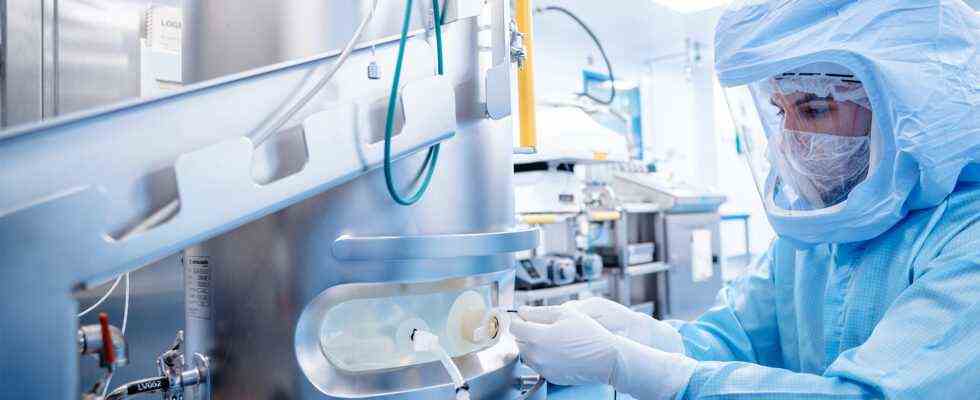Status: 05.11.2021 9:58 a.m.
An entire industry benefits from the global success of the Mainz vaccine manufacturer BioNTech. German biotech companies see new opportunities – but have to overcome hurdles in this country.
Without the two scientists, an award of this kind would probably not have been possible: Özlem Türeci and Uğur Şahin from the Mainz-based company BioNTech received the “Honorary Prize for Scientific and Social Commitment”. Türeci and Şahin recognized the great danger posed by Corona very early on. They had taken a high business risk in developing the vaccine. The cooperation with the US group Pfizer followed. Here, too, in the eyes of the jury, they “combined and advanced research, economy and social impact with a lot of foresight”, explains Wolfgang Glauner, Executive Director at Ernst & Young.
Türeci and Şahin were connected to yesterday’s “Entrepreneur of the year” event in Berlin. Both emphasized that the success of the corona vaccine would not have been possible without the performance of the entire BioNTech team. Both researchers also looked to the future and to the goal, which is why BioNTech was actually founded: the fight against cancer through immunotherapies. “Cancer is a very complex disease, but we are confident that we will all live to see it,” said Türeci.
From science to business
Krishnaraj Rajalingam is also based in Mainz in the new offices of the startup KHR Biotec. He looks intently into a microscope and examines a tissue sample. The cancer specialist is head of the Cell Biology Unit (CBU) at the Mainz University Medical Center. At the same time, Rajalingam has been the head of KHR Biotec for a few months. The company was spun off from university medicine in May.
“I would like to implement our findings from basic research for patients. At the university we do not have enough financial resources. With the spin-off I have completely different opportunities to finance and develop new therapies in the fight against cancer,” explains the cell researcher, who is now also an entrepreneur. With this, Rajalingam is following the path of Türeci and Şahin, who also launched BioNTech from the Mainz University Medical Center in 2009.
Rajalingam is researching a specific gene at KHR Biotec. It occurs in many tumors and ensures uncontrolled cell growth. The first anti-cancer drugs against this gene are already available. Rajalingam wants to attack the environment with his method, interrupt the signal transmission and thus stop tumor growth. “I also want to use this procedure to individualize the treatment of tumors.”
The BioNTech founders Ugur Sahin and Özlem Türeci.
Image: via REUTERS
Private investors finance research at KHR Biotech. Previously, his university work had been financially supported by the German Research Foundation for many years. KHR currently has five employees and is looking for further specialists, because clinical studies are to begin next year. The patent for the active ingredient has already been applied for.
Cooperation and Networks
The young company KHR Biotech cooperates closely with a Hamburg company – the Indivumed company. This has one of the world’s largest tumor databases. The managing director is Hartmut Juhl, who has known Rajalingam for years through several research projects. “At Indivumed, we have set up a globally unique system that can be used to decode cancer using data – also using artificial intelligence,” explains Juhl.
Both companies want to use their specific skills to advance new therapies together. But for this they need permanent private capital. Juhl is confident here: “The success of BioNTech has increased the industry’s acceptance – especially in the USA. It should be easier to get venture capital from there. In Germany, on the other hand, I am skeptical because there is no risk culture here. ”
In Mainz it is only a ten minute walk from KHR Biotec to the BioNTech company building. Scientifically and economically, however, there are worlds between the two companies. Rajalingam still feels encouraged. “BioNTech motivated me long before your success against Corona. I am very pleased that you are now a company with world fame.” That is the result of almost three decades of hard work. “Türeci and Şahin are another example of why basic research needs ongoing support in order to be able to really help patients.”
Location Germany: light and shadow
Ricardo Gent observes companies like KHR Biotec at the German Chemical Industry Association (VCI). Ghent is the managing director of the Biotechnology Industry Association in the VCI. The number of employees has recently risen to more than 44,000. Sales also grew last year by 14 percent to more than 14 billion euros. That corresponds to a third of the entire pharmaceutical market in Germany. “In a European comparison, research in this country is well positioned. The USA is a leader internationally for many reasons,” says Gent.
Despite the positive overall development on the German market, he also sees structural disadvantages such as weak digitization or too much bureaucracy: “It takes too long to turn an idea into a product. In the Czech Republic or Spain, approvals go much faster.” These are also reasons why Germany has been falling behind as a production location in a global comparison for years.
BioNTech co-founder Türeci emphasized at the ceremony in Berlin that there were still major challenges ahead of her company: “We are now not only drug developers, but also drug manufacturers with a great deal of responsibility. We must continue to transform ourselves as a company.” Due to its successes, BioNTech will probably continue to be in the focus of the global public in the future.

